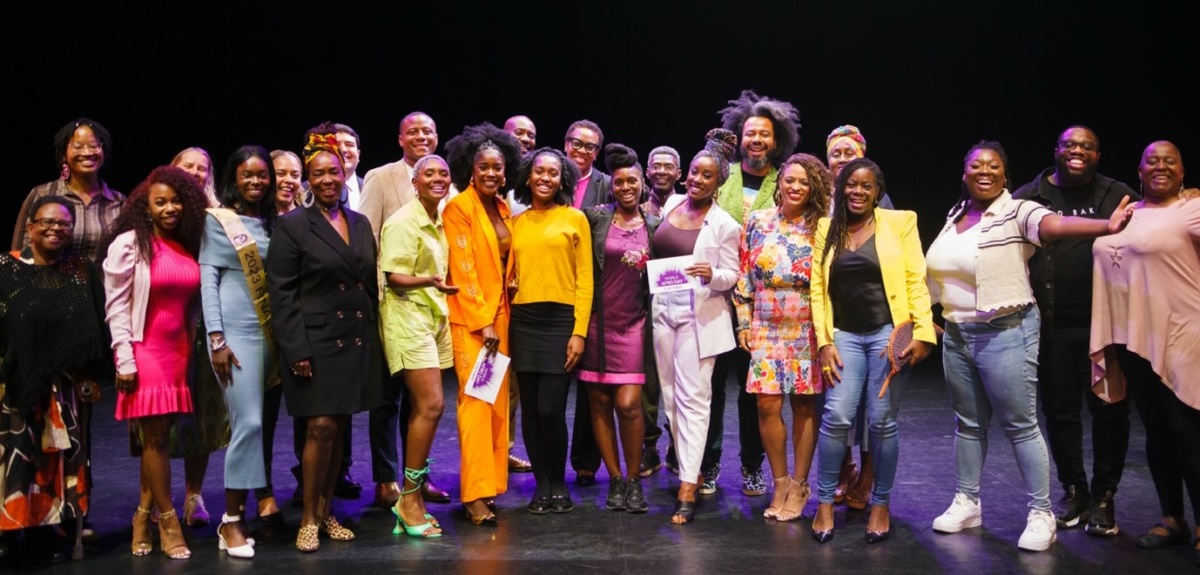
Bringing your authentic self to the workplace, sounds good in theory but how many companies really understand what this means for African heritage employees? Look at the colour, vibrancy and diversity in this image, so many workplaces don’t look like this but why? Now, put aside the dress code, can you tell which aspect of their appearance is being celebrated here? OK, the truth is that they are looking happy because they had the freedom to wear their hair in an Afrocentric and authentic way for World Afro Day, 15th September 2023.
World Afro Day® is a global day of celebration and liberation for Afro hair and identity, with an estimated reach of 1.5 billion. Since 2017 our work has influenced the UN, UK government, global brands, international media and major celebrities. This year we decided to turn our attention to Afro hair acceptance in the workplace and we felt that it was important to understand the issue from the employer’s perspective. Previously, most of the research had been focused on Black employees’ experiences. Headland Communications Consultancy invited me in to give a presentation, entitled “Talking My Language” to inspire better communication around subjects of racial difference and particularly the experience of having Afro hair in the workplace.
During the session, Headland employees were given some history and an explanation of Afro hair discrimination from childhood to adulthood. The participants watched a few short film clips and took part in exercises and discussions to explore their awareness and understanding of Afro hair discrimination in the UK. The presentation was interactive with many opportunities to ask questions. Headland workers were engaged and reflective about the content and towards the end of the hour, they were asked to say in their own words, what the three key themes of World Afro Day meant: celebration, liberation and identity? Three different participants answered confidently from their own perspective, which contrasted from earlier on in the session, when they felt less sure of the subject matter. After the presentation many Headland colleagues asked many further questions and asked for some recommended reading. Some young Black interns were also keen to find out more about the work of World Afro Day.
What was clear from my experience of engaging directly with Headland, The Financial Conduct Authority and other workplaces this year is that there is real ignorance around Afro hair discrimination. Businesses may not be aware of their biases against Afro hair and how this can impact their hiring decisions and behaviour towards their colleagues.
A Headland employee said: “Thank you – my eyes have been really opened as to the often-hidden influence/ role hair plays in inequality and discrimination practices.”
Going into Headland was a really positive experience for me and the presentation was also considered a success from their perspective. This was the feedback:
100% agreed “Education and training is important to change attitudes to Afro hair and Afrocentric styles at work.
The majority agreed and none disagreed that “Updating the Equality Law to include hair discrimination would create positive change in workplaces.”
The session at Headland also contributed to further research as a case study in the Workplace Hair Acceptance report, conducted in collaboration with Shift Insight. The research found that bias against Afro hair in the workplace is likely to cost jobs. The survey of 1000 UK and US decision-makers: CEOs, Line Managers, HR Professionals and DEI Specialists; were given a real incident of Afro hair discrimination: when a woman did not pass her probation because of her Afro hair. More than a third of the survey respondents, believed it could possibly happen in their own workplace. While one fifth, thought it could definitely happen in their workplace. Findings also revealed a clear lack of understanding of what is legal and discriminatory towards Afro hair and Afrocentric hairstyles. Even companies with a strong DEI commitment showed the same bias against Afrocentric hairstyles.
The group image at the top goes against the status quo in many workplaces and this is confirmed by the research. Results show a hierarchy of hairstyles from more Eurocentric decreasing to Afrocentric styles. In fact, 84% considered straight hair on a woman appropriate in all circumstances versus 64% who felt an Afrocentric hairstyle (braids with buns) was appropriate. Several Afrocentric hairstyles were considered completely inappropriate for the workplace by over 1 in 10 respondents (12%).
Bringing your authentic self to work, is a phrase that ironically needs a revamp in order to be truly genuine, because it currently doesn’t really apply to African heritage employees. Research from the Black British Voices report of 10,000 respondents showed 98% of Black Britons said they have compromised self-expression and identity to fit into the workplace.
Hairstyle was named as one of the key issues.
So, you might be a Senior Manager reading this, thinking that: I didn’t have a clue that Afro hair was a major employment issue. So, what do you do now? Do you want to lead change, ignore the issue or sit back and wait for something else to happen? You can start by 1) Reading the Workplace Hair Acceptance Report 2) Book training or consultation for your company 3) Host a World Afro Day – Workplace event 15th September 2024. For more information, simply visit www.worldafroday.com.

*Headspace is part of our internal Learning and Development programme where we welcome a wide range of speakers and perspectives to share their views, insights and stories with the team.
Read more Insights & News
